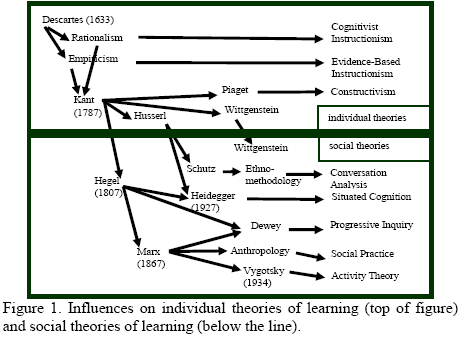Learning theory: Difference between revisions
(using an external editor) |
mNo edit summary |
||
| Line 1: | Line 1: | ||
{{ | {{incomplete}} | ||
== Definition == | == Definition == | ||
| Line 40: | Line 40: | ||
No instructional model and no technology is "innocent". They all put constraints on what [[learning type | kinds of learning]] you can hope to implement. | No instructional model and no technology is "innocent". They all put constraints on what [[learning type | kinds of learning]] you can hope to implement. | ||
The opposite is also true. [[User:DSchneider|DSchneider]] argues that the kind [[learning level | levels of learning ]] or [[learning type | leades to different views of what learning is. | |||
== Links == | == Links == | ||
Revision as of 10:14, 22 May 2006
Definition
Learning theories make general statements about how people learn (at least for a given class of learning types. Therefore learning theories are mostly descriptive.
As an example, situated learning claims that learning is strongly tied to the context and the activity in which it occurs. In order to learn a concept in a useful way it must be learned in the culture in which is has been developed and is used. Activity and perception are prior to conceptualization. The teaching and learning situation is characterized as cognitive apprenticeship. From that follows that the acitvity of learning must take place in an authentic situation.
Learning theories also can be prescriptive (tell how people should learn), but mostly prescription is the role of pedagogical theory.
Major schools of thought
In the literature related to education (in particular in educational technology, it is not always easy to separate learning theory from educational theory.
Most introductory texts distinguish between three large families of thought.
- Behaviorism is interested in looking at behavior and observable changes. Therefore behaviorism in instruction focusses on generating new behavior patterns.
- Cognitivism is interested in looking at the thought processes behind the behavior. Therefore cognitivist learning theory stresses acquisition of (including reorganization) of cognitive structures.
- Constructivism claims that knowledge is constructed through the interplay of existing knowledge and individual (or social) experience. There are several variants, e.g.
The difference between behaviorist views and cognitivist views are that cognitivism makes explicit assumptions on how we store and manipulate informations and that education should be concerned by analyzing and influencing thought processes. The difference beween cognitivism and constructivism is that cognitivists like behaviorists are "objectivists", knowledge and tasks to be learned can be identified and performance can be measured. Constructivist, on the other hand believe that both learning
History
(very shortly for the moment)
Gerry Stahl (2003: 6) provideded a graphical representation of how philosophical influences led various theories of leaning, in particular social versus individual theories. On the right hand side of the picture is a list of learning theories.
Note: 19:26, 15 May 2006 (MEST) would not qualify activity theory as a learning theory, but rather as a framework to analyse social behavior.
Why bother ?
Learning theories play a major role in most instructional design models and the field educational technology
No instructional model and no technology is "innocent". They all put constraints on what kinds of learning you can hope to implement.
The opposite is also true. DSchneider argues that the kind levels of learning or [[learning type | leades to different views of what learning is.
Links
- Learning Theories
- Explorations in Learning & Instruction: The Theory Into Practice Database, probably the best hypertext available
- Marcel Crahay, Psychologie du développement et apprentissage en situation scolaire (71211) Support du cours
- Blaise Balmer, Histoire illustrée des théories de l'apprentissage
- Depover Christian, Bruno De Lièvre, Jean-Jacques Quintin, Filippo Porco et Cédric Floquet. Les modèles d'enseignement et d'apprentissage
- Peter J. Patsula, Sookmyung Women's University, Seoul. (1999). Applying Learning Theories to Online Instructional Design
References
- Stahl, G. (2003) Building Collaborative Knowing: Elements Of A Social Theory Of CSCL, In J.W. Strijbos, P.Kirschner & R. Martins (ed.), What we know about CSCL in higher education, Amsterdam: Kluwer.
